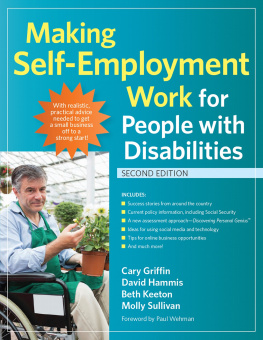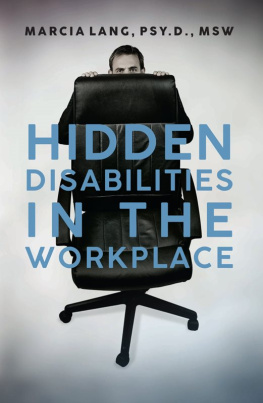Disability KEY ISSUES AND FUTURE DIRECTIONS
EMPLOYMENT
AND WORK
The SAGE Reference Series
on Disability: Key Issues
and Future Directions
Series Editor: Gary L. Albrecht
Arts and Humanities, by Brenda Jo Brueggemann
Assistive Technology and Science, by Cathy Bodine
Disability Through the Life Course, by Tamar Heller and Sarah Parker Harris
Education, by Cheryl Hanley-Maxwell and Lana Collet-Klingenberg
Employment and Work, by Susanne M. Bruyre and Linda Barrington
Ethics, Law, and Policy, by Jerome E. Bickenbach
Health and Medicine, by Ross M. Mullner
Rehabilitation Interventions, by Margaret A. Turk and Nancy R. Mudrick
Disability KEY ISSUES AND FUTURE DIRECTIONS
EMPLOYMENT
AND WORK
Susanne M. Bruyre
Cornell University
Linda Barrington
Cornell University
SERIES EDITOR
Gary L. Albrecht
University of Illinois at Chicago
FOR INFORMATION:
SAGE Publications, Inc.
2455 Teller Road
Thousand Oaks, California 91320
E-mail:
SAGE Publications Ltd.
1 Olivers Yard
55 City Road
London EC1Y 1SP
United Kingdom
SAGE Publications India Pvt. Ltd.
B 1/I 1 Mohan Cooperative Industrial Area
Mathura Road, New Delhi 110 044
India
SAGE Publications Asia-Pacific Pte. Ltd.
3 Church Street
#1004 Samsung Hub
Singapore 049483
Publisher: Rolf A. Janke
Acquisitions Editor: Jim Brace-Thompson
Assistant to the Publisher: Michele Thompson
Project Development, Editing, & Management: Kevin Hillstrom, Laurie Collier Hillstrom
Production Editor: David C. Felts
Reference Systems Manager: Leticia Gutierrez
Reference Systems Coordinator: Laura Notton
Typesetter: C&M Digitals (P) Ltd.
Proofreader: Annie Lubinsky
Indexer: Sylvia Coates
Cover Designer: Gail Buschman
Marketing Managers: Kristi Ward, Carmel Schrire
Copyright 2012 by SAGE Publications, Inc.
All rights reserved. No part of this book may be reproduced or utilized in any form or by any means, electronic or mechanical, including photocopying, recording, or by any information storage and retrieval system, without permission in writing from the publisher.
Printed in the United States of America.
Library of Congress Cataloging-in-Publication Data
Bruyre, Susanne M. Employment and work / Susanne M. Bruyre, Linda Barrington.
p. cm.(The SAGE reference series on disability: key issues and future directions)
Includes bibliographical references and index.
ISBN 978-1-4129-9292-3 (cloth)
1. People with disabilitiesEmployment. 2. Work environment. I. Barrington, Linda. II. Title.
HD7255.B78 2012
331.59dc23 2012020493
12 13 14 15 16 10 9 8 7 6 5 4 3 2 1
Contents
Gary L. Albrecht
Sara Furguson, Sara VanLooy,
Susanne M. Bruyre, and Linda Barrington
William Erickson, Sarah von Schrader,
Susanne M. Bruyre, and Linda Barrington
Sara Furguson, Sara VanLooy, and Susanne M. Bruyre
Sara Furguson, Sara VanLooy, and Susanne M. Bruyre
Series Introduction
T he SAGE Reference Series on Disability appears at a time when global attention is being focused on disability at all levels of society. Researchers, service providers, and policymakers are concerned with the prevalence, experience, meanings, and costs of disability because of the growing impact of disability on individuals and their families and subsequent increased demand for services (Banta & de Wit, 2008; Martin et al., 2010; Mont, 2007; Whitaker, 2010). For their part, disabled people and their families are keenly interested in taking a more proactive stance in recognizing and dealing with disability in their lives (Charlton, 1998; Iezzoni & ODay, 2006). As a result, there is burgeoning literature, heightened Web activity, myriad Internet information and discussion groups, and new policy proposals and programs designed to produce evidence and disseminate information so that people with disabilities may be informed and live more independently (see, for example, the World Institute of Disability Web site at ).
Disability is recognized as a critical medical and social problem in current society, central to the discussions of health care and social welfare policies taking place around the world. The prominence of these disability issues is highlighted by the attention given to them by the most respected national and international organizations. The World Report on Disability (2011), co-sponsored by the World Health Organization (WHO) and the World Bank and based on an analysis of surveys from over 100 countries, estimates that 15% of the worlds population (more than 1 billion people) currently experiences disability. This is the best prevalence estimate available today and indicates a marked increase over previous epidemiological calculations. Based on this work, the British medical journal Lancet dedicated an entire issue (November 28, 2009) to disability, focusing attention on the salience of the problem for health care systems worldwide. In addition, the WHO has developed community-based rehabilitation principles and strategies which are applicable to communities of diverse cultures and at all levels of development (WHO, 2010). The World Bank is concerned because of the link between disability and poverty (World Bank, 2004). Disability, in their view, could be a major impediment to economic development, particularly in emerging economies.
Efforts to address the problem of disability also have legal and human rights implications. Being disabled has historically led to discrimination, stigma, and dependency, which diminish an individuals full rights to citizenship and equality (European Disability Forum, 2003). In response to these concerns, the United Nations Convention on the Rights of Persons with Disabilities (2008) and the European Union Disability Strategy embodying the Charter of Fundamental Rights (2000) were passed to affirm that disabled people have the right to acquire and change nationalities, cannot be deprived of their ability to exercise liberty, have freedom of movement, are free to leave any country including their own, are not deprived of the right to enter their own country, and have access to the welfare and benefits afforded to any citizen of their country. As of March 31, 2010, 144 nationsincluding the United States, China, India, and Russiahad signed the U.N. Convention, and the European Union Disability Strategy had been ratified by all members of the European Community. These international agreements supplement and elaborate disability rights legislation such as the Americans with Disabilities Act of 1990 and its amendments, the U.K. Disability Discrimination Act of 1995, and the Disabled Persons Fundamental Law of Japan, revised in 1993.
In the United States, the Institute of Medicine of the National Academy of Sciences has persistently focused attention on the medical, public health, and social policy aspects of disability in a broad-ranging series of reports:








